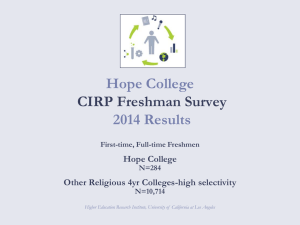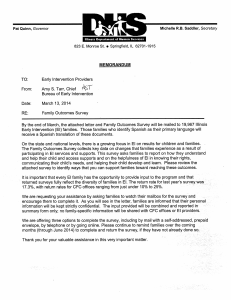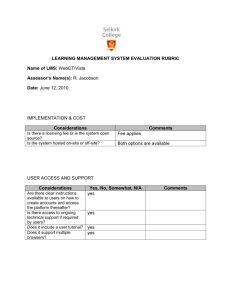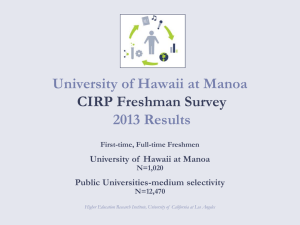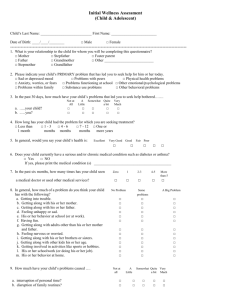Claremont McKenna College 2014 Results CIRP Freshman Survey
advertisement
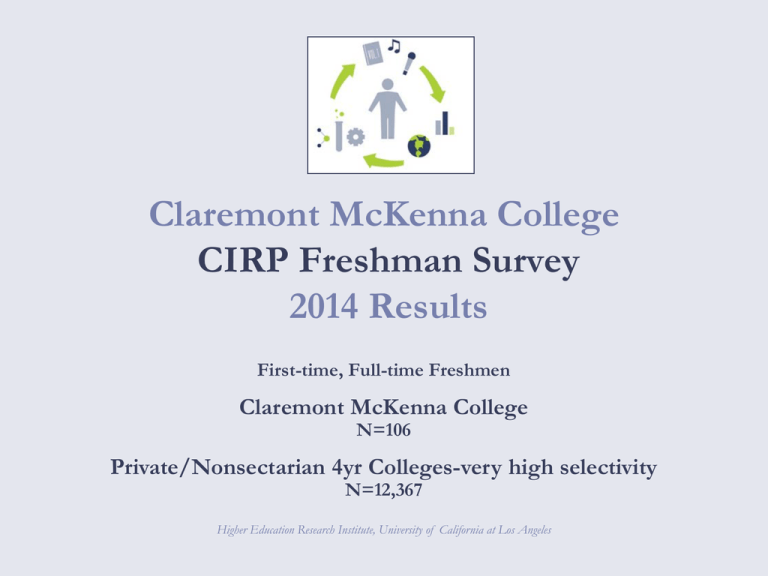
Claremont McKenna College CIRP Freshman Survey 2014 Results First-time, Full-time Freshmen Claremont McKenna College N=106 Private/Nonsectarian 4yr Colleges-very high selectivity N=12,367 Higher Education Research Institute, University of California at Los Angeles Return to contents INCOMING FIRST YEAR STUDENTS The First Year is Important… The CIRP Freshman Survey (TFS) collects important information on what your incoming students are like before they experience college. Key sections of the survey examine: • • • • • • College admissions decisions Financing college High school experiences and behaviors Knowledge, skills and abilities Expectations for college-major and career Expectations for college life Return to contents 2 Table of Contents Demographics Sex and Race/Ethnicity Distance from Home Type of High School College Admissions Decisions College Applications Accepted/Attending First Choice Reasons for Attending College Reasons for Attending This College Financing College Economic Situation Educational Expenses Ability to Finance Education High School Experience Academic Preparation Habits of Mind Construct Pluralistic Orientation Academic Self-Concept Civic Engagement Health and Wellness Knowledge, Skills and Abilities Expectations for CollegeMajor and Career Expectations for College Life Return to contents 3 A Note about CIRP Constructs We use the CIRP Constructs throughout this PowerPoint to help summarize important information about your students from the TFS. Constructs statistically aggregate the results from CIRP questions that tap into key aspects of the college experience. They focus on student traits and institutional practices contributing to students’ academic and social development. Return to contents 4 Demographics SEX Your Institution Comparison Group 37.7% 55.5% 62.3% Male Female Male 44.5% Female Return to contents 5 Demographics Race/Ethnicity 100% 90% 80% 70% 65.6% 60% 50% 47.1% 40% 30% 20% 10% 0% 17.3% 4.8% 4.4% 0.0% 13.6% 0.1% African American American/ Black Indian/ Alaska Native Asian/ Native Hawaiian/ Pacific Islander Your Institution 18.3% 9.6% 9.6% 5.0% Latino 2.9% White/ Caucasian 1.7% Other Race/ Ethnicity Two or More Races/ Ethnicities Comparison Group Return to contents 6 Demographics How many miles is this college from your permanent home? 100% 90% 80% 70% 59.4% 60% 50% 40.2% 40% 30% 40.0% 22.6% 20% 9.4% 10% 0% 0.0% 1.3% 0.0% 1.5% 5 or less 6-10 7.6% 8.5% 9.5% 11-50 51-100 Your Institution Comparison Group 101-500 Over 500 Return to contents 7 Demographics From what kind of high school did you graduate? 100% 90% 80% 70% 58.8% 60% 50% 50.9% 40% 32.1% 30% 25.3% 20% 10.4% 9.2% 10% 0% 2.8% 3.2% Public school (not charter or magnet) 2.8% 2.9% Public charter school Public magnet school Your Institution 0.9% 0.5% Private religious/parochial school Private independent college-prep school Home school Comparison Group Return to contents 8 College Admissions Decisions Many factors impact incoming students’ college choice, including the benefits they see in attending college and considerations about which specific college to attend. Return to contents College Admissions Decisions To how many colleges other than this one did you apply for admission this year? 100% 90% 80% 70% 60% 50% 40% 34.9% 29.7% 30% 20.8% 20% 10% 0% 11.3% 4.7% None 6.6% 5.0% 1 4.7% 4.6% 2 6.6% 5.7% 3 Your Institution 9.4% 7.6% 4 9.2% 5.7% 5 Comparison Group 17.0% 9.1% 7.5% 6 7-10 11 or more Return to contents 10 College Acceptance Is this college your … 100% Were you accepted by your first choice college? 90% 80% 70% 60% 57.5% 56.2% 50% 40% 37.7% 30% 62.3% 21.7% 20% 25.3% 11.3% 10% 0% Yes No First Choice Second Choice Your Institution 11.2% Third Choice 9.4% 7.3% Less than Third Choice Comparison Group Return to contents 11 College Choice In deciding to go to college , how important to you was each of the following reasons? 100% 90% 80% 70% 60% 79.2% 76.5% 83.0% 62.3% 61.1% 62.3% 57.6% 33.0% 31.8% 30.2% 33.5% 81.0% 50% 40% 30% 20% 10% 17.9% 20.2% 16.0% 17.6% 0% To be able to get a better job To gain a general education and appreciation of ideas Your Institution Very Important Somewhat Important To make me a more cultured person Comparison Group Very Important Somewhat Important To be able to make more money Return to contents 12 College Choice In deciding to go to college , how important to you was each of the following reasons? 100% 90% 80% 70% 60% 50% 49.5% 90.6% 88.4% 52.6% 53.8% 56.6% 40% 30% 20% 10% 0% 38.1% 9.4% 34.5% 36.8% 31.6% 10.8% To learn more about things that interest me To get training for a specific career Your Institution Very Important Somewhat Important Comparison Group Very Important Somewhat Important To prepare myself for graduate or professional school Return to contents 13 College Choice How important was each reason in your decision to attend this college ? 100% 90% 80% 70% 60% 50% 76.4% 63.0% 39.0% 53.0% 90.0% 41.6% 73.0% 54.7% 39.4% 36.1% 34.3% 34.9% 40% 30% 44.4% 20% 10% 0% 21.5% 30.0% 32.0% 37.8% 33.8% 22.0% 9.0% This college has a very good academic reputation This college has a good reputation for its social activities This college’s graduates This college’s gain admission to top graduates get good graduate/professional jobs schools Your Institution Comparison Group Very Important Very Important Somewhat Important Somewhat Important The percentage of students that graduate from this college Return to contents 14 College Choice How important was each reason in your decision to attend this college ? 100% 90% 80% 70% 60% 50% 40% 30% 32.2% 53.9% 30.0% 42.0% 20% 10% 14.0% 17.7% 24.0% 3.0% 2.0% 0% I was offered financial assistance 8.5% 30.2% The cost of attending this college Your Institution Very Important Somewhat Important 11.6% Not offered aid by first choice Comparison Group Very Important Somewhat Important 8.6% 3.0% 3.0% 9.9% Could not afford first choice Return to contents 15 College Choice How important was each reason in your decision to attend this college ? 100% 90% 80% 70% 34.0% 60% 50% 24.6% 19.0% 13.0% 59.6% 58.3% 40% 30% 20% 38.0% 41.8% 10% 8.0% 8.2% 21.0% 20.7% 52.0% 43.4% 21.2% 26.5% 0% My parents wanted me to come here I wanted to live near home Your Institution Very Important Somewhat Important Rankings in national magazines Comparison Group Very Important Somewhat Important A visit to the campus Return to contents 16 Financing College Economic factors play an important role in students’ decisions about college. Return to contents Financing College The percentage of students with at least some funds from these various sources. 92.3% Family resources 87.4% 57.5% Personal resources 59.5% 61.2% Aid not to be repaid 68.9% 42.5% Aid to be repaid 45.0% 8.5% Other sources 6.9% 0% 10% 20% 30% 40% Your Institution 50% 60% 70% 80% 90% 100% Comparison Group Return to contents 18 Financing College Do you have any concern about your ability to finance your college education? 100% 90% 80% 70% 60% 52.4% 50% 40% 49.8% 41.5% 37.1% 30% 20% 10.5% 10% 0% None Some Your Institution 8.6% Major Comparison Group Return to contents 19 High School Experiences Understanding students’ established behaviors in high school helps foster skills, knowledge and abilities in the curriculum and co-curriculum. Return to contents High School Experiences Please mark which of the following courses you have completed? 100% 97.1% 97.7% 95.2% 93.7% 90% 80% 70% 66.7% 62.9% 60% 55.5% 48.9% 50% 38.1% 40% 40.9% 29.5% 30% 26.2% 20% 10% 0% Algebra II Pre-Calculus/Trigonometry Probability & Statistics Calculus Your Institution Comparison Group AP Probability & Statistics AP Calculus Return to contents 21 High School Experiences Have you had any remedial work in any of the following subjects? 100% 90% 80% 70% 60% 50% 40% 30% 19.3% 20% 10% 0% 11.3% English 17.6% 15.1% 19.3% 10.4% Reading Your Institution Mathematics 16.2% 11.3% Writing Comparison Group Return to contents 22 High School Experiences Do you feel you will need any remedial work in any of the following subjects? 100% 90% 80% 70% 60% 50% 40% 30% 20% 10% 0% 9.2% 6.6% English 13.2% 5.7% 15.6% 7.9% Reading Your Institution Mathematics 9.4% 13.6% Writing Comparison Group Return to contents 23 Habits of Mind Habits of Mind is a unified measure of the behaviors and traits associated with academic success. These learning behaviors are seen as the foundation for lifelong learning. 60 Construct Items 58 56 54 56.3 55.8 53.0 55.6 53.3 52.8 52 50 48 46 44 42 40 All FTFT Your Institution Men • Support your opinion with logical argument • Seek solutions to problems and explain them to others • Seek alternative solutions to a problem • Evaluate the quality or reliability of information you received • Ask questions in class • Take a risk because you felt you had more to gain • Seek feedback on academic work • Explore topics on your own, even though it was not required for a class • Accept mistakes as part of the learning process • Revise your papers to improve your writing • Look up scientific research articles and resources Women Comparison Group Return to contents 24 Pluralistic Orientation Pluralistic Orientation measures skills and dispositions appropriate for living and working in a diverse society. 60 58 56 54 52 Construct Items 54.9 52.6 51.1 50.7 51.2 50 50.4 48 46 • Tolerance of others with different beliefs • Ability to work cooperatively with diverse people • Ability to discuss and negotiate controversial issues • Openness to having my views challenged • Ability to see the world from someone else's perspective 44 42 40 All FTFT Men Your Institution Women Comparison Group Return to contents 25 Academic Self-Concept Self-awareness and confidence in academic environments help students learn by encouraging their intellectual inquiry. Academic Self-Concept is a unified measure of students’ beliefs about their abilities and confidence in academic environments. 60 58 58.9 56.6 56 55.3 54 52 Construct Items 52.2 50.7 49.6 50 48 • Self-rated academic ability • Self-rated mathematical ability • Self-rated self-confidence (intellectual) • Self-rated drive to achieve 46 44 42 40 All FTFT Men Your Institution Women Comparison Group Return to contents 26 Civic Engagement Engaged citizens are a critical element in the functioning of our democratic society. Civic Engagement measures the extent to which students are motivated and involved in civic, electoral and political activities. 60 58 Construct Items 56 54 52 52.6 51.4 52.9 52.2 52.0 50.6 50 48 46 44 • Publicly communicated your opinion about a cause • Worked on a local, state, or national political campaign • Demonstrated for a cause • Keeping up to date with political affairs • Influencing social values • Helped raise money for a cause or campaign • Performed volunteer work 42 40 All FTFT Your Institution Men Women Comparison Group Return to contents 27 Health and Wellness 100% Students’ physical and emotional well-being can affect many important aspects of the student experience including academic performance and persistence. These items gauge student behaviors, attitudes and experiences related to health and wellness. 90% 80% 70% 39.0% 38.7% 60% 50% 8.6% 11.3% 43.8% 41.5% 40% 30% 53.3% 52.3% 20% 10% 0% Felt overwhelmed by all you had to do Your Institution Frequently Occasionally Felt depressed Comparison Group Frequently Occasionally Return to contents 28 Health and Wellness Do you have any of the following disabilities or medical conditions? 20% 11.5% 10% 11.2% 8.1% 6.3% 5.1% 3.3% 3.1% 0% Learning disability 2.1% ADHD 1.0% Autism spectrum Your Institution 2.1% Physical disability 3.1% 2.6% Chronic illness Psychological disorder Comparison Group Return to contents 29 Knowledge, Skills and Abilities These items illustrate students’ views of their academic skills and abilities. Return to contents High School Experiences At this institution, which course placement tests have you taken in the following subject areas: 100% 90% 80% 70% 60% 50% 39.0% 40% 30% 20% 10% 0% 6.4% 3.0% English 1.0% 3.1% Reading Your Institution 5.0% Mathematics 8.3% 3.0% Writing Comparison Group Return to contents 31 Knowledge, Skills and Abilities Think about your current abilities and tell us how strong or weak you believe you are in each of the following areas: 100% 90% 80% 70% 60% 37.9% 25.0% 30.1% 26.1% 50% 22.3% 40% 15.0% 30% 20% 44.7% 52.0% 53.4% 47.0% 37.9% 26.1% 10% 0% General knowledge Knowledge of a particular field or discipline Your Institution A Major Strength Somewhat Strong Comparison Group A Major Strength Somewhat Strong Foreign language ability Return to contents 32 Knowledge, Skills and Abilities Think about your current abilities and tell us how strong or weak you believe you are in each of the following areas: 100% 90% 80% 70% 60% 15.5% 14.6% 50% 13.8% 40% 18.4% 13.8% 13.5% 30% 20% 48.5% 35.6% 46.6% 32.0% 10% 40.8% 30.4% 0% Understanding of the problems facing your community Understanding of national issues Your Institution A Major Strength Somewhat Strong Comparison Group A Major Strength Somewhat Strong Understanding of global issues Return to contents 33 Knowledge, Skills and Abilities Think about your current abilities and tell us how strong or weak you believe you are in each of the following areas: 100% 90% 80% 70% 60% 56.3% 53.4% 26.6% 28.3% 50% 43.7% 40% 18.1% 30% 20% 38.8% 45.1% 38.8% 47.1% 24.3% 10% 31.9% 0% Critical thinking skills Problem-solving skills Your Institution A Major Strength Somewhat Strong Comparison Group A Major Strength Somewhat Strong Ability to manage your time effectively Return to contents 34 Knowledge, Skills and Abilities Think about your current abilities and tell us how strong or weak you believe you are in each of the following areas: 100% 90% 80% 70% 60% 50% 40.8% 19.4% 20.7% 14.4% 40% 30% 20% 42.7% 36.8% 39.8% 36.6% 10% 0% Knowledge of people from different races/cultures Your Institution A Major Strength Somewhat Strong Interpersonal skills Comparison Group A Major Strength Somewhat Strong Return to contents 35 Expectations for College: Major and Career Understanding students’ intended majors and career aspirations helps them plot an intentional and meaningful course of study. Return to contents Expectations: Major Please indicate your intended major. Your Inst Comp Group Your Inst Comp Group 0.0% 0.1% Fine Arts 1.9% 4.5% Biological & Life Sciences 14.2% 17.1% Mathematics or Computer Science 1.9% 4.9% Business 10.4% 9.2% Physical Science 1.9% 4.9% Education 0.9% 1.9% Social Science 25.5% 12.9% Engineering 4.7% 3.3% Justice and Security 0.0% 0.2% English 0.0% 3.4% Library Science 0.0% 0.0% Health Professions 1.9% 5.4% Other Non-technical 1.9% 1.2% History or Political Science Arts & Humanities 16.0% 8.2% Undecided 16.0% 17.1% 2.8% 5.7% Agriculture Return to contents 37 Expectations: Major Do you consider yourself Pre-Med or Pre-Law? 100% 90% 80% 70% 60% 50% 40% 30% 20% 18.5% 16.2% 12.4% 8.4% 10% 0% Pre-Med Pre-Law Your Institution Comparison Group Return to contents 38 Expectations: Career Please indicate your intended career. Your Inst Comp Group Health Professional 1.0% 5.8% 10.2% Homemaker/Stay-at-Home Parent 0.0% 0.8% 26.7% 11.7% Information Technology Professional 1.9% 2.0% Business (Admin Assistant) 0.0% 0.2% Lawyer 7.6% 4.7% Clergy 1.0% 1.0% Military 0.0% 0.7% College Faculty 1.9% 1.3% Nurse 0.0% 0.2% Communications 0.0% 1.6% Research Scientist 1.9% 6.5% 14.3% 11.0% Service Industry 0.0% 0.4% Agriculture/Natural Resources Artist Business Doctor (MD or DDS) Your Inst Comp Group 1.9% 1.6% 5.7% Education (elementary/secondary) Engineer 1.0% 4.4% Skilled worker 0.0% 0.1% 3.8% 2.6% Social/Non-Profit Services 0.0% 0.9% Government 3.8% 3.5% Other 4.8% 8.8% Return to contents 39 Expectations: Time to Degree How many years do you expect it will take you to graduate from this college? 100% 94.1% 91.8% 90% 80% 70% 60% 50% 40% 30% 20% 10% 0% 0.0% 0.0% 1 0.1% 0.0% 2 3.1% 5.1% 1.4% 3 Your Institution 4 1.7% 5 2.4% 0.0% 6+ 0.0% 0.3% Do not plan to graduate from this college Comparison Group Return to contents 40 Expectations: Degree Aspirations What is the highest academic degree that you intend to attain? 100% 90% 80% 70% 60% 50% 45.7% 40.4% 40% 30% 26.1% 20% 9.5% 10% 0% 1.0% 0.4% 0.0% 0.1% None Vocational certificate 14.3% 12.2% 16.2% 12.4% 12.4% 6.8% 0.0% 0.1% Associate Bachelor's Master's (A.A. or degree (B.A., degree equivalent) B.S., etc.) (M.A., M.S., etc.) Your Institution Ph.D. or Ed.D. M.D., D.O., J.D. (Law) D.D.S., D.V.M. 0.0% 0.1% 1.0% 1.4% B.D. or M.DIV. (Divinity) Other Comparison Group Return to contents 41 Expectations for College Life Understanding students’ expectations helps provide opportunities for students to grow intellectually, interpersonally and affectively. Return to contents Expectations for College Life What is your best guess as to the chances that you will: 100% 90% 80% 70% 60% 52.7% 42.1% 69.9% 54.3% 50% 66.6% 93.5% 40% 30% 20% 10% 32.3% 40.6% 21.5% 30.0% 27.8% 6.5% 0% Participate in volunteer or community service work Participate in a study abroad program Your Institution Comparison Group Very Good Chance Very Good Chance Some Chance Some Chance Discuss course content with students outside of class Return to contents 43 Expectations for College Life What is your best guess as to the chances that you will: 100% 90% 80% 70% 60% 53.8% 59.0% 35.3% 80.6% 50% 40% 30% 20% 10% 41.9% 36.2% 48.7% 3.4% 19.4% 2.2% 5.4% 0% Communicate regularly with your professors 11.4% Take a course exclusively online at this institution Your Institution Very Good Chance Some Chance Comparison Group Very Good Chance Some Chance Work on a professor’s research project Return to contents 44 Expectations for College Life What is your best guess as to the chances that you will: 100% 90% 80% 70% 60% 50% 40% 30% 20% 1.1% 4.5% 10% 18.5% 18.1% 0% Need extra time to complete your degree requirements 3.2% 4.3% 4.3% 2.6% 9.3% Take a leave of absence from this college temporarily Your Institution Very Good Chance Some Chance Comparison Group Very Good Chance Some Chance 4.3% 6.5% 15.2% Transfer to another college before graduating Return to contents 45 The more you get to know your students, the better you can understand their needs. For more information about HERI/CIRP Surveys The Freshman Survey Your First College Year Survey Diverse Learning Environments Survey College Senior Survey The Faculty Survey Please contact: heri@ucla.edu (310) 825-1925 www.heri.ucla.edu Return to contents 46
